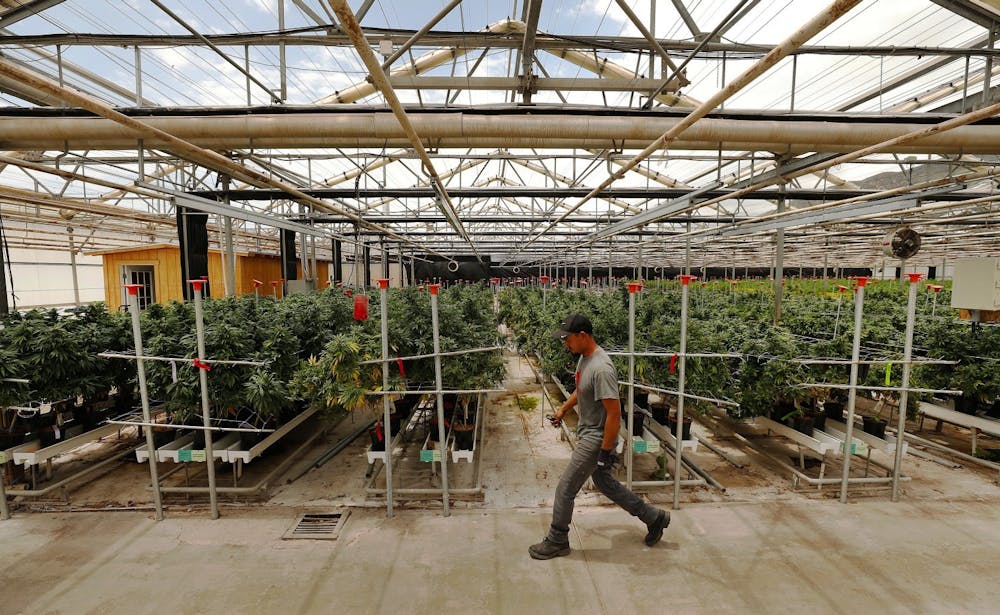President Richard Nixon declared a war on drugs in the 1970s, vastly increasing the federal government’s drug enforcement capabilities. The policy relentlessly targeted minority communities and resulted in a massive expansion of the United States prison population.
Today, Americans appear prepared to dismantle parts of Nixon’s 50-year war on drugs. According to the Pew Research Center, two-thirds of Americans support marijuana legalization, including a majority of both Democrats and Republicans.
Any plan to end the war on drugs, however, must seriously address its lasting consequences. Democratic presidential candidates Sens. Elizabeth Warren and Bernie Sanders’ proposals do that better than any other 2020 presidential candidates.
The war on drugs was racially and politically motivated from the start. Nixon’s domestic policy chief John Ehrlichman said in a 1994 interview that the policy was designed to target the White House’s enemies: the antiwar left and African Americans.
To an alarming extent, their strategy worked. The U.S. prison population grew from under 200,000 in 1970 to nearly 1.5 million in 2017, disproportionately incarcerating nonwhite men. Black men are 6 times more likely than white men to be incarcerated, and Hispanic men are 3 times more likely, according to a 2019 report from the Sentencing Project.
Despite similar usage rates, minorities are far more likely to be arrested for marijuana charges than white Americans. Nearly half a million people are in prison for a drug law violation, but black Americans and Latino Americans account for 80% of people serving time for federal drug offenses.
Warren and Sanders both propose using the president’s executive authority to declassify marijuana as a controlled substance, effectively legalizing it at the federal level. They also want to expunge all past federal marijuana-related convictions, reinvest additional tax revenue into communities affected most by the war on drugs and ensure people of color receive a fair share of the profits from the new marijuana market.
Warren’s plan includes at least $500 million annually to repair damage done in communities that have been targeted by the war on drugs. Sanders calls for using marijuana tax revenue to establish a $20 billion grant program within the Minority Business Development Agency to fund marijuana businesses owned by entrepreneurs of color. He plans to provide formerly incarcerated individuals with job training and technical support for starting businesses.
Both candidates emphasize minority ownership in the marijuana industry. Less than one-fifth of owners in the emerging industry were people of color in 2017, with black people accounting for less than 5%.
“We're going to provide help to the African American, Latino, Native American community to start businesses to sell legal marijuana, rather than let a few corporations control the legalized marijuana market,” Sanders said during Tuesday night’s Democratic debate.
Compared to other candidates, Warren and Sanders have the strongest platforms for ending the war on drugs.
Former Mayor Pete Buttigieg supports legalizing marijuana and expunging past federal convictions, but he does not have plans to reinvest tax revenue or ensure minority ownership in the marijuana industry. Both former Mayor Mike Bloomberg and former Vice President Joe Biden are opposed to marijuana legalization. However, they favor decriminalization and expunging past federal convictions.
While steps in the right direction, these candidates’ plans fail to specifically benefit communities most affected by the war on drugs. The legalization of marijuana requires reparations for the damage done by its prohibition and disproportionately racist enforcement. Warren and Sanders' plans achieve this.
Too often, racist policies are overturned without atoning for the harm they have caused. Unlike their rivals, Warren and Sanders both prioritize repairing the damage done and creating opportunities for those most affected.
Kyle Linder (he/him) is a junior studying journalism and international relations. He plans to pursue a career in media.






